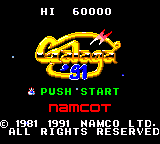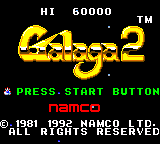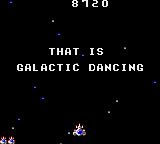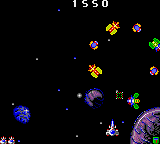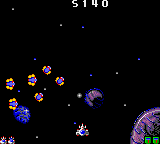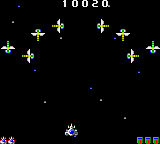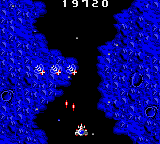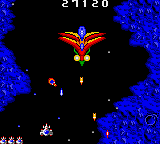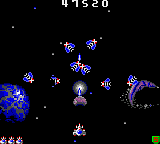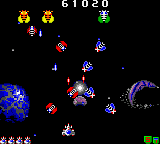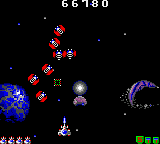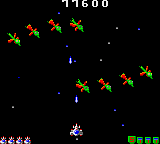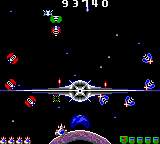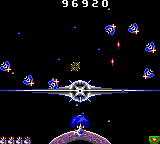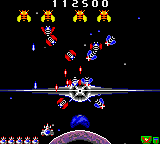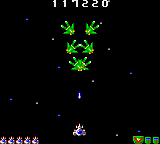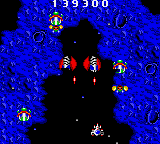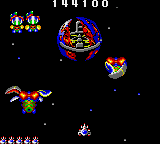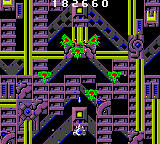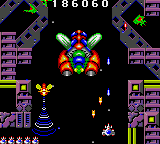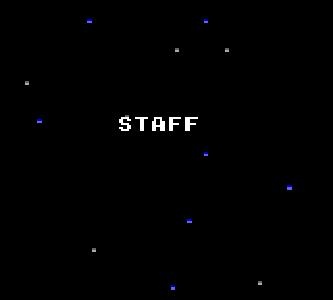Galaga '91
From Sega Retro
| ||||||||||||||||||||
| Galaga '91 | ||||||||||||||||||||
|---|---|---|---|---|---|---|---|---|---|---|---|---|---|---|---|---|---|---|---|---|
| System(s): Sega Game Gear | ||||||||||||||||||||
| Publisher: Namco | ||||||||||||||||||||
| Developer: Namco | ||||||||||||||||||||
| Original system(s): Namco System 1 arcade hardware | ||||||||||||||||||||
| Genre: Shooting[1][2] | ||||||||||||||||||||
| Number of players: 1 | ||||||||||||||||||||
| ||||||||||||||||||||
|
Galaga '91 (ギャラガ’91) is a sequel to Namco's 1981 arcade classic, Galaga (brought to the SG-1000 as Sega-Galaga). It is actually a port of Galaga '88, originally released in arcades in 1988, retitled to reflect its Sega Game Gear release of 1991. It is the first portable installment in the Galaxian series.
Galaga '88/'91 builds on the gameplay seen in Galaxian, Galaga and Gaplus, the most notable addition being the inclusion of more detailed backgrounds (as opposed to coloured scrolling starfields). The Game Gear version was not released in North America.
Contents
Story
An intergalactic organization, the United Galaxy Space Force, deploys a lone starfighter to rid the galaxy of the hostile Galaga aliens, who plan to eradicate all of mankind.
Gameplay
Galaga '91 is a fixed shooter video game. The player controls a lone starfighter throughout eleven different stages, each becoming progressively difficult. Stages are indicated by small emblems located at the bottom-right of the screen. In each stage, the objective is to destroy all of the Galaga aliens, which fly into formation from the top and sides of the screen. Some enemies fire projectiles at the player, some enemies divebomb towards the player and attempt to collide with their ship, and some enemies spawn other enemies.
Most stages are fixed and do not scroll. Enemies enter in formation, and all enemies must be destroyed to complete the stage. Some enemies screen-wrap to the top of the screen when they reach the bottom.
The ship moves horizontally with ![]() and
and ![]() ; it cannot move vertically. It fires with
; it cannot move vertically. It fires with ![]() , which can be held to fire continually.
, which can be held to fire continually.
Stages
Stages 3, 8, and 12 are bonus levels, which are indicated by the text "That Is Galactic Dancing." In these, enemies fly into the screen along pre-set paths without attacking the player. Players can shoot down the aliens to earn bonus points; destroying all enemies awards the player a large sum of points.
Stages 4, 13, and 14 are vertically scrolling. Enemies fly in as before, but it is not necessary to destroy all of them to proceed. The screen continuously scrolls upwards until the end, where there is a boss fight.
History
Galaga '91 can cause confusion not just because of its arcade origins three years prior, but because in Europe, this Game Gear version was retitled (again) as Galaga 2, being marketed as a direct sequel to Galaga. It is, however, the fourth game in the series; being preceeded by the 1979 arcade game, Galaxian, Galaga in 1981 and finally Gaplus in 1984 (sometimes called Galaga 3 - an equally misleading title). To make matters worse, Namco released an arcade sequel called Galaxian³ (also known as Galaxian 3') in 1990, and the TurboGrafx-16 port of Galaga '88/'91 is called Galaga '90. More recent games have opted to avoid numbering systems and always use the Galaga name.
Production credits
- Planner: Psychic
- Music: N O B I
- Programmer: Early Bird
- Graphic: Karashi
- Adviser: Silky No 1, Haro 7000
- Special Thanks: Nigel
- Producer: Mac
Magazine articles
- Main article: Galaga '91/Magazine articles.
Physical scans
| Sega Retro Average | ||||||||||||||||||||||||||||||||||||||||||||||||||||||||||||||||||||||||||||||||||||||||||||||||||||||||||||||||||
|---|---|---|---|---|---|---|---|---|---|---|---|---|---|---|---|---|---|---|---|---|---|---|---|---|---|---|---|---|---|---|---|---|---|---|---|---|---|---|---|---|---|---|---|---|---|---|---|---|---|---|---|---|---|---|---|---|---|---|---|---|---|---|---|---|---|---|---|---|---|---|---|---|---|---|---|---|---|---|---|---|---|---|---|---|---|---|---|---|---|---|---|---|---|---|---|---|---|---|---|---|---|---|---|---|---|---|---|---|---|---|---|---|---|---|
|
| 67 | |
|---|---|
| Based on 22 reviews | |
Technical information
ROM dump status
| System | Hash | Size | Build Date | Source | Comments | |||||||||
|---|---|---|---|---|---|---|---|---|---|---|---|---|---|---|
| ? |
|
128kB | Cartridge (EU) | |||||||||||
| ? |
|
128kB | Cartridge (JP) |
References
NEC Retro has more information related to Galaga '88
|
- ↑ File:Galaga2 GG EU back.jpg
- ↑ 2.0 2.1 http://sega.jp/fb/segahard/gg/soft_licensee.html (Wayback Machine: 2013-01-01 20:24)
- ↑ 3.0 3.1 Sega Power, "August 1993" (UK; 1993-07-01), page 13
- ↑ 4.0 4.1 ACE, "February 1992" (UK; 1992-01-08), page 93
- ↑ File:Galaga 2 GG credits.pdf
- ↑ 1700 igr dlya Sega, "" (RU; 2001-xx-xx), page 122
- ↑ Beep! MegaDrive, "November 1991" (JP; 1991-10-08), page 39
- ↑ Console XS, "June/July 1992" (UK; 1992-04-23), page 148
- ↑ Computer & Video Games, "February 1992 (Go! Issue 4)" (UK; 1992-01-15), page 20
- ↑ Famitsu, "1991-11-01" (JP; 1991-10-18), page 39
- ↑ Game Mania, "May 1993" (UK; 1993-xx-xx), page 70
- ↑ Gamers, "Februar/März 1992" (DE; 1992-xx-xx), page 38
- ↑ Gamers, "August/September 1993" (DE; 1993-07-23), page 67
- ↑ Game Zone, "February 1992" (UK; 1992-01-24), page 62
- ↑ Hippon Super, "December 1991" (JP; 1991-11-05), page 89
- ↑ Joypad, "Janvier 1992" (FR; 1991-12-1x), page 106
- ↑ Joypad, "Juillet/Août 1993" (FR; 1993-0x-xx), page 112
- ↑ Joystick, "Décembre 1991" (FR; 1991-1x-xx), page 131
- ↑ Mega Force, "Ete 1993" (FR; 1993-0x-xx), page 138
- ↑ Mean Machines Sega, "October 1992" (UK; 1992-09-xx), page 143
- ↑ Player One, "Juillet/Août 1993" (FR; 1993-07-10), page 106
- ↑ Sega Pro, "Christmas 1991" (UK; 1991-12-12), page 70
- ↑ Sega Pro, "April 1993" (UK; 1993-03-11), page 74
- ↑ Sega Pro, "August 1993" (UK; 1993-07-08), page 65
- ↑ Sega Saturn Magazine, "September 1995" (JP; 1995-08-08), page 88
- ↑ Sonic the Comic, "24th July 1993" (UK; 1993-07-24), page 12
| Galaga '91 | |
|---|---|
|
Main page | Comparisons | Magazine articles | Reception | Bootlegs | |
